As Time Runs Short in Current Council Period, Criminal Code Revisions Receive Final Vote

With only two Legislative Meetings remaining in the current 2021-2022 Council Period, for pending legislation, it is a now-or-never moment. Bills must either receive two needed votes before the end of the year, or essentially start from scratch in 2023. One critical measure that has waited not two years but over a dozen decades to come to fruition was the complete revision and update of the District’s criminal code. In the second of two needed votes, the Council unanimously passed the criminal code rewrite at its most recent meeting.
The District’s criminal code was last fully rewritten back in 1901, by Congress, during a time when the District as a society was completely different, and our population of roughly 280,000 was deeply discriminatory based on race and gender. Though updated many times in the intervening 120 years, the document still contained numerous historical anachronisms and the inconsistencies that come with serially rewriting a long text without re-starting from scratch in over a century. After what in comparison to this 120-year slog seems like a quite brief fifteen years, an independent Criminal Code Reform Commission/Project completed its comprehensive review of the code and provided its recommendations to the Council last year.
In addition to modernizing and streamlining the criminal code, the bill also makes some substantive changes. Mandatory minimum sentences for crimes other than first-degree murder are eliminated, the right to a jury trial is gradually phased in to apply those charged with misdemeanors but facing jail time, and some maximum criminal penalties are reduced to be in line with sentences actually handed down in recent criminal judgments.
As we all know and regret, the District’s Home Rule Charter requires all legislation passed by the Council and signed by the mayor to undergo a thirty legislative day Congressional review period prior to becoming District law. Interestingly, and shockingly, Congress created a special category just for bills related to much of the criminal code, meaning that these bills must be held over in Congress for literally double the normal time–fully sixty legislative days. Such will be the case for the present rewrite of the Criminal Code. However, since the rewrite will not become effective until 2025, the slow-walked Congressional review is frustrating mainly just in principle.
In other action at the most recent Legislative Meeting, the Council approved two measures dealing with senior hunger, nutrition, and food insecurity measures on the first of two necessary votes. The Council also approved a bill on the first of two votes to modify the required qualification for service on the board of directors of the Washington Metropolitan Area Transit Authority to specify that demonstrated interest and experience in public transit are sufficient qualifications for service. On an emergency basis, the Council also passed a measure exempting the much-anticipated 11th Street Bridge park project from certain environmental regulations, given the unique nature and impact of the project, thus allowing the project to proceed.
The Council’s final two Legislative Meetings of Council Period 24 will be held on December 6 and December 20.